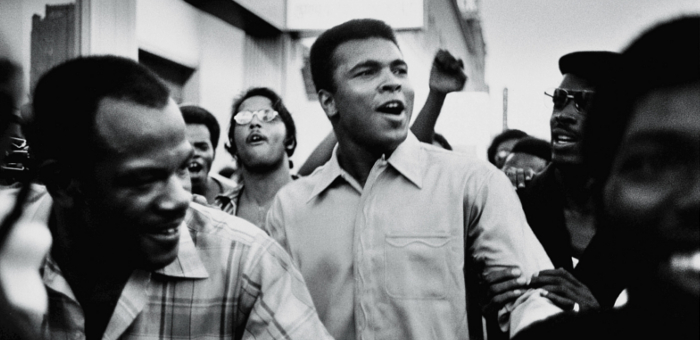Pound For Pound: Siegel’s Critical Bio-bit Middleweight
There have been plenty of formidable docs on ‘The People’s Champ’ – most notably Leon Gast’s When We Were Kings and the Consentino’s miniseries Muhammad Ali: The Whole Story – but often the focus inevitably rests on his prowess as an athlete. Here, Siegel frames Ali as anything but ‘The People’s Champ’, beginning just after his baby-faced 1960 Olympic win, we follow his career through the backlash of his sensationalistic name change, through the outrage and legal turmoil that tailed him after claiming to be a conscientious objector when drafted to serve time fighting in the Vietnam War. Boxing is kept to a minimum, mostly due to the fact that he was banned from the sport during this time, losing his boxing license for his refusal to serve in the military. Instead, a collage of Ali’s early firebrand interviews serve as the primary reminder of the icon we recognize in our mind’s eye.
During the time spent away from the ring, Ali made his living via public engagements and college speaking tours, which initially went over like bricks on babies. Vietnam was not yet publicly perceived as a fruitless bloodbath and people saw Ali as a wealthy draft dodger claiming religious belief as a red herring to get out of military service. So, when appearing before crowds he was initially accosted by infuriated citizens, but as time went by, his talent with a mic, his wholehearted public commitment to Islam and his firm stance on the honorable depiction of black heritage morphed his public image into a noble civil rights leader, not just in the eyes fringe Islamic leaders Elijah Muhammad and Malcom X, but also the much more accepted judgement of Martin Luther King Jr.
Siegel calls on those few surviving friends and associates from that period to speak of their memories. Ali’s second wife, Belinda Boyd, along with former financial backers, and religious affiliates all impart their side of the story as they remember it, but it always comes back to the brazenly charismatic boxer jabbing his mouth, for better or worse. When recollecting Ali outside the ring, Siegel realized it’s often best to let the man speak for himself, since what he chose to shout to the hills was ultimately his choice, controversial or not. The man remains a cultural enigma. The Trials of Muhammad Ali paints a picture of Ali obscured by hidden hands, a national hero turned villain. Times were-a-changin’ and Ali was but a cog in the cultural machine, destined to come around again. The film is a middling, but honest depiction of Ali’s most tumultuous period that, despite reminding of his unfavorable choices, ends up leaving the boxer to wriggle back into pop culture where he will forever and always be remembered as ‘The Greatest’, no matter what reality tells us.
